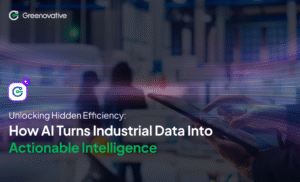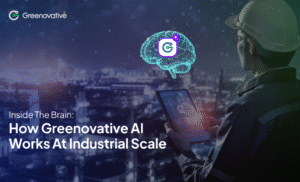Introduction
In the manufacturing sector, one-size-fits-all AI solutions often fall short of addressing the nuanced complexities of diverse plants, processes, and workflows. Each manufacturing facility operates with its unique parameters, such as equipment specifications, energy consumption patterns, and operational goals. This diversity demands custom AI models tailored to specific processes and industry requirements. By leveraging domain expertise and specialized data, custom AI models empower manufacturers to optimize operations, enhance decision-making, and achieve operational excellence.
This blog explores how custom AI models are revolutionizing manufacturing by addressing industry-specific challenges and delivering measurable impact.
Why Generic AI Falls Short in Manufacturing
Generic AI solutions often lack the precision and adaptability needed for manufacturing environments. Common limitations include:
- Limited Process Understanding: Generic AI lacks knowledge of specific manufacturing processes, leading to inaccurate insights.
- Inconsistent Performance: Standard AI models may not account for varying parameters across production lines, plants, or equipment.
- Data Irrelevance: Pre-trained models are often built on datasets unrelated to manufacturing, resulting in suboptimal outcomes.
Custom AI models overcome these limitations by aligning AI capabilities with the unique dynamics of manufacturing processes and plants.
Key Benefits of Custom AI Models in Manufacturing
- Precision and Relevance
- Custom models are trained on plant-specific datasets, ensuring insights tailored to each facility’s unique operational dynamics.
- These models adapt to varying process parameters, such as temperature thresholds, machine specifications, and production timelines.
- Scalability for Diverse Facilities
- Tailored models can scale across multiple manufacturing plants, accommodating their unique configurations and requirements.
- The adaptability of custom AI ensures consistent performance across plants with diverse operational setups.
- Enhanced Decision-Making
- By integrating domain expertise, custom models provide actionable insights for optimizing production workflows.
- Predictive analytics helps manufacturers anticipate risks, improve quality control, and reduce downtime.
Applications of Custom AI Models in Manufacturing
- Predictive Maintenance:
- Custom AI models analyze equipment-specific data to predict failures and recommend maintenance schedules tailored to each machine.
- By considering unique equipment parameters, these models minimize downtime and extend asset lifecycle.
- Process Optimization:
- AI tailors recommendations to improve energy efficiency, reduce waste, and streamline workflows for specific production lines.
- Custom models enable real-time adjustments based on process-specific data, such as flow rates, material properties, or machine settings.
- Energy Management:
- Custom AI models optimize energy consumption based on plant-specific usage patterns and renewable energy availability.
- By benchmarking energy performance across facilities, manufacturers can identify inefficiencies and implement targeted improvements.
- Quality Assurance:
- AI-driven inspection systems adapt to product-specific quality parameters, identifying defects with greater accuracy than generic models.
- These systems enable continuous quality monitoring, ensuring product consistency across production runs.
How to Build and Implement Custom AI Models in Manufacturing
- Define Plant-Specific Objectives
- Collaborate with plant managers and engineers to identify specific operational challenges and goals.
- Establish clear metrics for success, such as reduced downtime, improved yield, or energy savings.
- Collect and Prepare Relevant Data
- Gather high-quality data from sensors, production logs, and equipment monitoring systems.
- Ensure data accuracy and relevance by tailoring datasets to specific processes or equipment.
- Partner with AI Specialists
- Work with AI developers who understand manufacturing processes and can align models with operational goals.
- Leverage pre-built frameworks while customizing them to address plant-specific challenges.
- Test, Refine, and Scale
- Pilot the model on a single production line or facility to validate its performance.
- Continuously refine the model based on feedback and extend its deployment across other plants or processes.
Challenges and Considerations
While custom AI models offer immense potential, manufacturers must address key challenges:
- Data Privacy and Security: Handling sensitive operational data requires robust safeguards to prevent breaches.
- Integration with Legacy Systems: Retrofitting AI into existing manufacturing infrastructure requires expertise and investment.
- Talent Gaps: Bridging the gap between AI specialists and manufacturing engineers is critical for building effective models.
The Future of Custom AI Models in Manufacturing
As manufacturing evolves, the demand for custom AI models will continue to grow. Advanced technologies such as federated learning and edge AI will enhance the precision and scalability of these models, enabling manufacturers to address challenges in real-time. By investing in custom AI, manufacturers can drive innovation, achieve operational efficiency, and maintain a competitive edge.
Conclusion: Tailoring AI to Drive Manufacturing Excellence
Custom AI models are no longer optional but essential for manufacturers aiming to address plant-specific challenges and achieve industry-leading performance. By delivering precise, scalable, and actionable insights, these models empower manufacturers to optimize operations, enhance decision-making, and maintain a competitive edge in an increasingly complex industry landscape. For leaders in manufacturing, the path forward lies in embracing AI as a tailored tool for transformation.
Are you ready to unlock the potential of custom AI models? Click here to schedule a demo or contact our sales team to learn more.
























